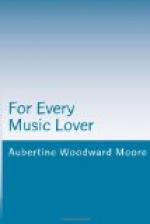Thus arose the Mystery, Miracle, Morality and Passion Plays, the direct progenitors of the Opera and the Oratorio. The descent of the Opera may be traced also to another source, to the secular play which persisted in the face of ecclesiastical disfavor and the ban that excluded its players from the church sacraments.
Strolling histriones, jongleurs and minstrels passed from court to court, appeared in castle yards, market places or village greens, recited, acted, sang, danced and played on musical instruments. They afforded a welcome means of communication with the outside world; they broke up the monotony of life when events were few. As modern music rests on the two pillars of the Gregorian chant and the folk-song, so the opera rests on the two pillars of the religious drama and the people’s play.
During the high tide of the revival of Greek learning in Italy, late in the sixteenth century, a group of the aspiring young nobility of Florence, gentlemen and gentlewomen, adopting the dignified name of the “Academy,” resolved to recover the much discussed music of the Greek drama. The place of rendezvous was the palace of Count Bardi, a member of one of the oldest patrician families in Tuscany. Edifying discourse and laudable exercises were indulged in by the guests, among whom were several persons of genius and learning. The meetings were presided over by the host, himself a poet and composer, as well as a patron of the fine arts.
The culture of the times demanded a higher gratification for man’s dramatic cravings than either rude religious or secular plays afforded. Other music was required to depict the emotions than that of the contrapuntist, with its puzzling intricacies. So thought these ardent Hellenists, and a burning zeal possessed them to mate dramatic poetry with a music that would heighten and intensify its expression and effect. They who seek are sure to find, even if it be not always the object of their search. In the earnest quest of these reformers for dramatic truth an unexpected treasure was disclosed.




